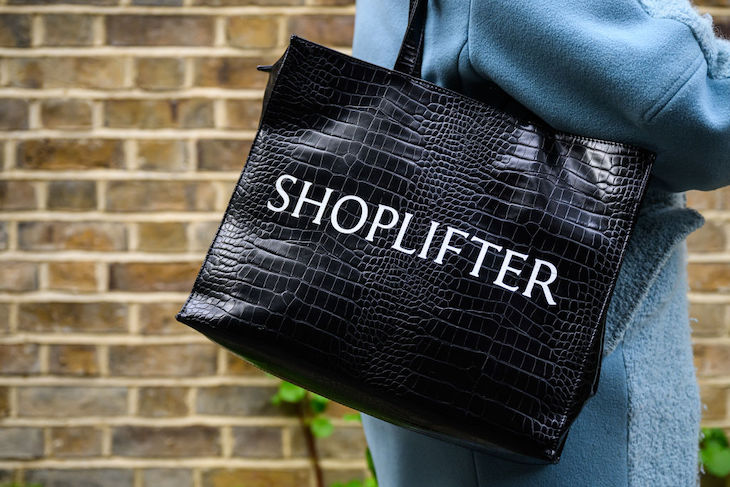Middle-class shoplifting is pushing up high street prices, according to Dame Diana Johnson, the policing and crime minister. Can she be right? If my own middle-class acquaintances are anything to go on, the answer is clear: yes.
Many of those pilfering from our shops look just like you and me
OK, we know shop theft is on a steep upward trajectory. There are nearly 17,000 incidents every day in corner shops alone, costing £316 million each year. Shoplifting across the whole retail sector costs billions. The reality is that many of those pilfering from our shops look just like you and me.
My own experience is that many reasonably well-off people will indeed shoplift, or, if you will, ‘restaurant-lift’, when the opportunity presents itself. Maybe they don’t go in intending to steal, though some do, but the effect is the same. And, remarkably, it doesn’t trouble their consciences at all, because they invent such great excuses.
Here’s an example. I was recently chatting to some friends about whether you should tell supermarket staff if you’ve been under-charged, perhaps as a result of the scanner failing to register something. I’m not a saint, but for me there’s no moral dilemma. You go to someone in uniform, explain and get your credit card out.
But a few of our number would do no such thing. Their reason? Tesco (or whoever) makes billions, and if they can’t get their technology to work, that’s their problem, and it’s not like they’re going to miss a few quid.
Hmm. OK. So, what about failing to inform an owner-run restaurant that they’ve under-charged? That too is, in effect, shoplifting, right? Well, apparently, there’s a sound reason for keeping shtum: restaurants often overcharge customers, even if only by accident, so saying nothing is just the customer getting their own back. What goes around, comes around. See?
If that doesn’t make you see red, how about the disgraceful people who buy an outfit with no intention of keeping it, wear it just once at a party, then take it back for a refund? This kind of fraud is so common there’s a name for it: wardrobing. It costs UK retailers up to £1.5 billion each year, all recouped from us mugs who actually pay for stuff. Yet the perpetrators convince themselves that it’s somehow a victimless crime, or even no crime at all.
And what about train fare dodging, a close relation of shoplifting? Shadow justice secretary Robert Jenrick has caused a stir recently, shaming the dodgers and showing how it costs Transport for London £130 million a year, for which the honest punter pays in higher fares.
But are the criminals always scallywags jumping barriers? Not necessarily. A few years ago, a well-paid computer programmer explained to me how he travelled on the Tube for free. He would start in zone two, displaying his travelcard to staff on the gates, then exit in central London by waving an old zone-one ticket and claiming that the barrier didn’t work. Did he need the cash? No. But he reckoned that if the system had such holes in it, TfL was asking for trouble.
If you think he’s a one-off, how about those people who won’t tap in and out late in the evening when the barriers are down? Their excuse? The rail companies provide an overpriced service, and it’s only reasonable to get some money back when nobody’s looking. Two wrongs make a right.
Depressingly, this attitude is becoming increasingly common in Britain. One explanation is that as the country has become more diverse, we’ve lost ‘social capital’ and a sense of communal obligation. Values we once associated with ‘respectable people’ aren’t fashionable. Instead, we admire non-conformists and transgressors.
But even that doesn’t account for the surge in criminality just recently. Lockdown fostered a get-something-for nothing culture. When millions of folk are paid to stay at home, it’s not surprising that some start to think they’re owed not just a living but a few freebies. Especially when they hear that stealing stuff worth less than £200 is a ‘summary-only’ offence – meaning the most likely outcome, even if you’re caught, is a slap on the wrist.
Too many well-off criminals, with names like Rupert and Olivia, get treated like heroes. They throw paint over priceless paintings, and block the M25, causing untold damage. Yet they are regarded, not as criminals but ‘campaigners’. How many well-off offenders, as a result, start to believe that their motives for crime must always be pure?
‘Ethics are what you do when nobody else is looking’ is a saying worth living by. It’s a great way of keeping yourself on the straight and narrow. But it doesn’t work with folk who intellectualise their crimes and convince themselves that their behaviour is justifiable. This attitude is one of the reasons, frankly, why our society is going down the pan.







Comments